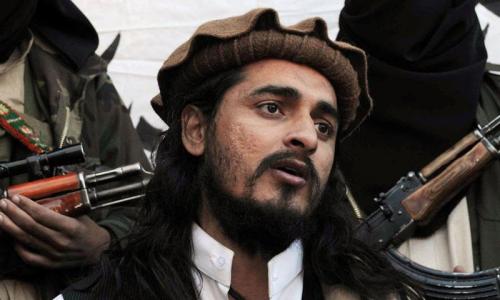PESHAWAR: A US drone strike in the Tal area of Khyber Pakhtunkhwa's Hangu district killed at least six people, including a senior member of the Taliban-linked Haqqani network, and injured another early on Thursday.
The drone fired three missiles targeting a seminary near Tandharo village, a few yards from Tehsil Tal's main Tal bazaar, which lies within the settled areas of the province. The room targetted by the drone was destroyed in the strike leaving the remaining space of the seminary undamaged.
Tal police official Sher Zaman said six people were killed in the attack. The six include Kaleemullah, Abdul Rehman, Mufti Hamidullah Haqqani, Maulvi Ahmed Jan, Abdullah and Gul Marjan, he said.
Moreover, sources told Dawn.com that Jan is said to be a key leader associated with the Haqqani network.
Official sources said Jan, believed to be a key leader of Haqqani network, had come to visit madrassah teacher Gul Marjan.
Other sources said that Abdul Rehman, an Afghan guest at the seminary, was also said to be a key leader of the network.
A resident of the area Islam Bahadar told Dawn.com that the two were present in the area for the past three to four days and that the locals had been witnessing at least four five drones flying over the madrassah and the adjacent Afghan refugee camp.
Some sources also said that Jan or Rehman might have been the target but Mufti Hamidullah, also a key figure, might have been on the hit list.
Reuters moreover reported that a source with Afghanistan's National Directorate of Security intelligence agency in Kabul said that Jan was an adviser to Sirajuddin Haqqani, the chief of the Haqqani network.
Separately, a Pakistani intelligence source told Reuters that Sirajuddin was spotted at the targeted seminary two days earlier.
Taliban sources also confirmed Jan’s death but the Haqqani network itself was not immediately available for comment.
Mufti Naimatullah, the in-charge of the seminary, however said that those killed in the strike have been identified as Maulvi Usman, a Pakistani national, while the other four killed were Afghans.
The Afghans killed in the strike are Mufti Hamidullah Haqqani, Abdul Rehman, Qari Noor Wali and Gul Marjan, he said.
The seminary that was struck has about 200 students, out of whom 70-80 stay for the night. Ten teachers teach at the seminary.
A room near the main gate of the seminary was hit thrice — the first strike occurred at 4.42, the second after 10 minutes of the first and the third after another five minutes. It has 12 rooms in all.
The madrassah was founded in 1980 and came to be properly managed from 1990.
Naimatulalh said the madrassah had “no links to any Haqqani network”.
Pakistan condemns strike
Pakistan strongly condemned the drone strike reiterating its stance that the strikes violate the country’s “sovereignty and territorial integrity”.
Foreign Office Spokesman Aizaz Ahmed Chaudhry in a statement said “there is an across the board consensus in Pakistan that these drone strikes must end”.
The spokesman said the government had been raising its concern over drone strikes with the US administration and at the United Nations.
He said the prime minister during his recent visit to the US had raised the issue with President Barack Obama and other senior US leaders.
The spokesman said it has been consistently maintained that drone strikes are counter-productive, entail loss of innocent civilian lives and have human rights and humanitarian implications. Such strikes also set dangerous precedents in the inter-state relations.
He said these strikes have a negative impact on the government’s efforts to bring peace and stability in Pakistan and in the region.
The last drone strike in the country was conducted on Nov 1 killing chief of the Tehrik-i-Taliban Pakistan (TTP), Hakimullah Mehsud, in the North Waziristan tribal region.
Today’s drone strike was the first by the US to occur outside Pakistan's remote tribal region, after the Pakistan Tehrik-i-Insaaf (PTI) came to power in the province. The latest attack could increase tensions between Islamabad and Washington.
The only other drone attack in the settled areas of KP was carried out in Bannu district in Nov 2008.
Thursday’s attack comes a day after Prime Minister Nawaz Sharif's Adviser on Foreign Affairs and National Security Sartaj Aziz said the US had assured Pakistan of not conducting drone strikes targeting the leaders of TTP if dialogue began between them and the Pakistani government.














































